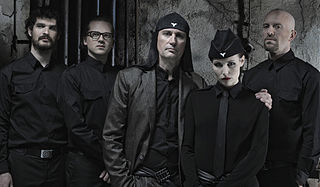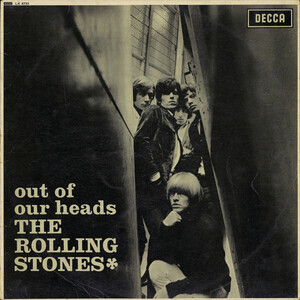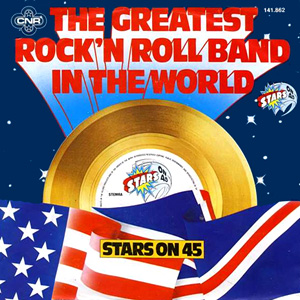
Laibach is a Slovenian and Yugoslav avant-garde music group associated with the industrial, martial, and neo-classical genres. Formed in 1980 in the mining town of Trbovlje, Slovenia, at the time a constituent republic within Socialist Federal Republic of Yugoslavia, Laibach represents the musical wing of the Neue Slowenische Kunst (NSK) art collective, a group which Laibach co-founded in 1984.

"Sympathy for the Devil" is a song by English rock band the Rolling Stones. The song was written by Mick Jagger and credited to the Jagger–Richards partnership. It is the opening track on the band's 1968 album Beggars Banquet. The song has received critical acclaim and features on Rolling Stone magazine's "The 500 Greatest Songs of All Time" list, being ranked number 106 in the 2021 edition.

Beggars Banquet is the seventh U.K. and ninth U.S. studio album by the English rock band the Rolling Stones, released on 6 December 1968 by Decca Records in the United Kingdom and by London Records in the United States. It was the first Rolling Stones album produced by Jimmy Miller, whose production work formed a key aspect of the group's sound throughout the late 1960s and early 1970s.

Out of Our Heads is the third studio album by the English rock band the Rolling Stones, released in two editions with different covers and track listings. In the US, London Records released it on 30 July 1965 as the band's fourth American album, while Decca Records released its UK edition on 24 September 1965 as the third British album.

The Rolling Stones Rock and Roll Circus is a British concert film hosted by and featuring the Rolling Stones, filmed on 11–12 December 1968. It was directed by Michael Lindsay-Hogg, who proposed the idea of a "rock and roll circus" to Jagger. The show was filmed on a makeshift circus stage with Jethro Tull, The Who, Taj Mahal, Marianne Faithfull, and the Rolling Stones. John Lennon and his fiancee Yoko Ono performed as part of a one-shot supergroup called The Dirty Mac, featuring Eric Clapton on guitar, Mitch Mitchell on drums, and the Stones' Keith Richards on bass. The recently formed Led Zeppelin had been considered for inclusion, but the idea was rejected.

"Dancing in the Street" is a song written by Marvin Gaye, William Stevenson, and Ivy Jo Hunter. It first became popular in 1964 when recorded by Martha and the Vandellas whose version reached No. 2 on the Billboard Hot 100 chart for two weeks, behind "Do Wah Diddy Diddy" by Manfred Mann and it also peaked at No. 4 on the UK Singles Chart following a rerelease in 1969. It is one of Motown's signature songs and is the group's premier signature song.

Singles 1968–1971 is a box set compilation of singles by the Rolling Stones spanning the years 1968 to 1971. Released in 2005 by ABKCO Records, who license the Rolling Stones' 1963–1970 recorded works, Singles 1968–1971 was the third of three successive volumes to commemorate their non-LP releases during this era.

"You Can't Always Get What You Want" is a song by the English rock band the Rolling Stones from their 1969 album Let It Bleed. Written by Mick Jagger and Keith Richards, it was named as the 100th greatest song of all time by Rolling Stone magazine in its 2004 list of the "500 Greatest Songs of All Time" before dropping a place the following year.

Metamorphosis is the third compilation album of the Rolling Stones music released by former manager Allen Klein's ABKCO Records after the band's departure from Decca and Klein. Released in 1975, Metamorphosis centres on outtakes and alternate versions of well-known songs recorded from 1964 to 1970.

Singles Collection: The London Years is a compilation album by the Rolling Stones, released in 1989. It was released as a 3-CD and a 4-LP set.

Gimme Shelter is a 1970 American documentary film directed by Albert and David Maysles and Charlotte Zwerin chronicling the last weeks of the Rolling Stones' 1969 US tour which culminated in the disastrous Altamont Free Concert and the killing of Meredith Hunter. The film is named after "Gimme Shelter", the lead track from the group's 1969 album Let It Bleed. Gimme Shelter was screened out of competition as the opening film of the 1971 Cannes Film Festival.

"Under My Thumb" is a song recorded by the English rock band the Rolling Stones. Written by Mick Jagger and Keith Richards, "Under My Thumb" features a marimba played by Brian Jones. Although it was never released as a single in English-speaking countries, it is one of the band's more popular songs from the mid-1960s and appears on several best-of compilations, such as Hot Rocks 1964–1971. It was included as the fourth track on both the American and United Kingdom versions of the band's 1966 studio album Aftermath.

"Waiting on a Friend" is a song by the English rock band the Rolling Stones from their 1981 album Tattoo You. Written by Mick Jagger and Keith Richards and released as the album's second single, it reached No. 13 on the Billboard Hot 100 singles chart in the US.

"The Last Time" is a song by the English rock band the Rolling Stones featuring the Andrew Oldham Orchestra, and the band's first original song released as an A-single in the UK. Written by Mick Jagger and Keith Richards, and recorded at RCA Studios in Hollywood, California in January 1965, "The Last Time" was the band's third UK single to reach number one on the UK Singles Chart, spending three weeks at the top in March and early April 1965. It reached number two in the Irish Singles Chart in March 1965, and was released on the US version of the album Out of Our Heads on 30 July 1965.

"Devils Haircut" is a song by the American musician Beck, released in December 1996 by DGC Records as the second single from his fifth album, Odelay (1996). Both co-written and co-produced by Beck, the song peaked at number 94 on the US Billboard Hot 100, number 23 on the Billboard Modern Rock Tracks chart and number 22 on the UK Singles Chart. Its music video was directed by Mark Romanek and filmed in New York City. Melody Maker ranked "Devils Haircut" number six in their list of "Singles of the Year" in 1996, while Q Magazine included it in their list of the "1001 Best Songs Ever" in 2003.

Shine a Light is a 2008 concert film directed by Martin Scorsese documenting the Rolling Stones' 2006 Beacon Theatre performances during their A Bigger Bang Tour. The film also includes archive footage from the band's career and makes use of digital cinematography for backstage sequences, the first time Scorsese used the technology in a film. The film takes its title from the song of the same name, featured on the band's 1972 album Exile on Main St. A soundtrack album was released in April 2008 on the Universal label. This is also the last movie by Paramount Classics, as the company merged into its sister company Paramount Vantage after the movie was released.

"The Greatest Rock 'n Roll Band in the World" a.k.a. "Stars Medley" a.k.a. "Stars on 45 III: Rollin' Stars" is a song issued in June 1982 by the Dutch studio group Stars on 45, in the UK, credited to 'Starsound', in the US, credited to 'Stars On'. It was the second single from the band's third full-length release The Superstars.

Videosex was a Yugoslav synth-pop band formed in Ljubljana in 1982. The band was one of the most prominent acts of the Yugoslav synth-pop scene.

"Sweet Thing" is a song recorded by English singer-songwriter Mick Jagger who also wrote it. It was the first single from his third solo album, Wandering Spirit (1993), and was released in January 1993 by Atlantic Records. It was produced by Jagger with Rick Rubin, and became a top-ten hit in Austria, France, Norway and Switzerland. In the United States, it peaked at number 84 on the Billboard Hot 100.

The Singles 1971–2006 is a box set compilation of singles by The Rolling Stones spanning the years 1971 to 2006. It covers their output with both Rolling Stones Records and Virgin Records labels.




















